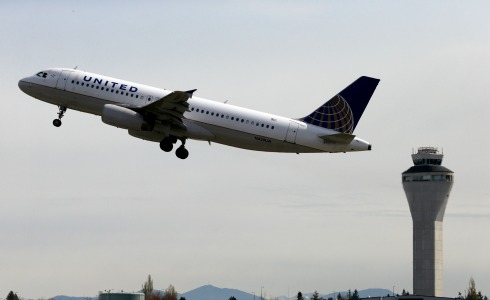 In this April 23, 2013 photo, a United Airlines jet departs in view of the air traffic control tower at Seattle-Tacoma International Airport in Seattle. With flight delays mounting, the Senate approved hurry-up legislation Thursday night to end air traffic controller furloughs blamed for inconveniencing large numbers of travelers. A House vote on the measure was expected as early as Friday, with lawmakers eager to embark on a weeklong vacation. (AP Photo/Elaine Thompson)
In this April 23, 2013 photo, a United Airlines jet departs in view of the air traffic control tower at Seattle-Tacoma International Airport in Seattle. With flight delays mounting, the Senate approved hurry-up legislation Thursday night to end air traffic controller furloughs blamed for inconveniencing large numbers of travelers. A House vote on the measure was expected as early as Friday, with lawmakers eager to embark on a weeklong vacation. (AP Photo/Elaine Thompson)
WASHINGTON — Legislation to end furloughs of air traffic controllers and delays for millions of travelers is headed to a House vote after a dark-of-night vote in the Senate that took place after most lawmakers had left the Capitol for a weeklong vacation.
The bill passed late Thursday without even a roll call vote, and House officials indicated it likely would be brought up for quick approval there.
Under the legislation, the Federal Aviation Administration would gain authority to transfer up to $253 million from accounts that are flush into other programs, to “prevent reduced operations and staffing” through the Sept. 30 end of the fiscal year.
In addition to restoring full staffing by controllers, Senate officials said the available funds should be ample enough to prevent the closure of small airport towers around the country. The FAA has said it will shut the facilities as it makes its share of $85 billion in across-the-board spending cuts — known as the sequester — that took effect last month at numerous government agencies.
The Senate acted as the FAA said there had been at least 863 flights delayed on Wednesday “attributable to staffing reductions resulting from the furlough.”
Administration officials participated in the negotiations that led to the deal and evidently registered no objections.
After the vote, White House press secretary Jay Carney said, “It will be good news for America’s traveling public if Congress spares them these unnecessary delays. But ultimately, this is no more than a temporary Band-Aid that fails to address the overarching threat to our economy posed by the sequester’s mindless, across-the-board cuts.”
Sen. Susan Collins, R-Maine, a key participant in the talks, said the legislation would “prevent what otherwise would have been intolerable delays in the air travel system, inconveniencing travelers and hurting the economy.”
Senate approval followed several hours of pressure-filled, closed-door negotiations, and came after most senators had departed the Capitol on the assumption that the talks had fallen short.
Officials said a small group of senators insisted on a last-ditch effort at an agreement before Congress adjourned for a vacation that could have become politically problematic if the flight delays continued.
“I want to do it right now. There are other senators you’d have to ask what the hang-up is,” Sen. Mark Udall, D-Colo., said at a point when it appeared no compromise would emerge.
For the White House and Senate Democrats, the discussions on legislation relating to one relatively small slice of the $85 billion in spending cuts marked a shift in position in a long-running struggle with Republicans over budget issues. Similarly, the turn of events marked at least modest vindication of a decision by the House GOP last winter to finesse some budget struggles in order to focus public attention on the across-the-board cuts in hopes they would gain leverage over President Barack Obama.
The Professional Aviation Safety Specialists, a union that represents FAA employees, reported a number of incidents it said were due to the furloughs.
In one case, it said several flights headed for Long Island MacArthur Airport in New York were diverted on Wednesday when a piece of equipment failed. “While the policy for this equipment is immediate restoral, due to sequestration and furloughs it was changed to next-day restoral,” the union said.
It added it was “learning of additional impacts nationwide, including open watches, increased restoration times, delays resulting from insufficient funding for parts and equipment, modernization delays, missed or deferred preventative maintenance, and reduced redundancy.”

